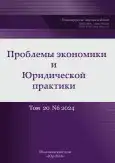About some Approaches to the International Law in British Scientists’ Researches (Part III)
- Authors: Grigoryan A.S.
- Issue: Vol 20, No 6 (2024)
- Pages: 125-137
- Section: International Legal Sciences
- URL: https://journal-vniispk.ru/2541-8025/article/view/284587
- DOI: https://doi.org/10.33693/2541-8025-2024-20-6-125-137
- EDN: https://elibrary.ru/EUFGJV
- ID: 284587
Cite item
Abstract
In the continuation of a series of articles devoted to the research of approaches to international law in the scientific doctrine of Great Britain, this study touches on the views of James Leslie Brierly, a well-known English lawyer of the 20th century. Several generations of British scientists and practicing lawyers have taken as a basis his conceptual views on international law. In the publications of Russian lawyers he is also often mentioned, his ideas are cited. One of his most famous books is «The outlook for International Law». This work contains lots of interesting findings that characterize critical understanding of international law in the UK shortly before the creation of the United Nations (UN), including the English worldview in relation to the formation of the post-war world order and the development on this basis of a «new» international law.
Full Text
##article.viewOnOriginalSite##About the authors
Alexander S. Grigoryan
Author for correspondence.
Email: grigoryan84@inbox.ru
SPIN-code: 9391-5013
Cand. Sci. (Law), independent researcher
Russian FederationReferences
- Al Ali Nasser Abdel Rahim. International legal nihilism in modern international relations: challenges and legal aspects // Agrarian and Land Law. 2023. No. 3(219). pp. 216–218.
- Anufrieva L.P. Legal Capacity of International Organizations of Regional Economic Integration in International Law // Legal Capacity: General Theoretical, Sectoral and International Legal Analysis: Collection of Materials for the XII Annual Scientific Readings in Memory of Professor S.N.Bratus / V.F.Yakovlev, T.Ya.Khabrieva, V.K.Andreev, et al. Moscow: Institute of Legislation and Comparative Law under the Government of the Russian Federation; Statute. Moscow, 2017. P. 99–108.
- Arkhangelskaya A.A. The Foreign Policy Mechanism of the Union of South Africa and the Development of its Diplomatic Relations (1910–1948) // Journal of the Institute for African Studies, No. 3 (52), 2020. Pp. 74–86.
- Bogdanov O.V. Twenty Years of the UN and the Task of Maintaining Peace and Security // Soviet Yearbook of International Law 1964–1965. Nauka Publishing House, Moscow, 1966. Pp. 17–32.
- Borsch Irina. International Law and the Orthodox Church: Ideas of M.V. Zyzykin in the 1930s // Russian Sociological Review. 2021. Vol. 20. No. 1. Pp. 176–201.
- Brierly J.L. The outlook for International Law. Oxford. At the Clarendon Press, 1944. 143 p.
- Valeev Revol M. Codification of the Law of International Treaties (to the 40th Anniversary of the Vienna Convention on International Treaties) // Moscow Journal of International Law. No. 2, 2009. Pp. 136–145.
- Kalamkaryan R.A., Migachev Yu.I. International Law: Textbook. —M.: Eksmo Publishing House, 2004. —688 p. (Russian Legal Education).
- Kapustin A.Ya. International Law in the Conditions of Transformation of Contemporary World Order // Journal of Foreign Legislation and Comparative Law, No. 5/2015. Pp. 850–857.
- Kartashkin V.A. The Supremacy of International Law in World Politics and at the National Level // Observer, No. 11/2015. Pp. 112–122.
- Kostin S.A. International legal base of the collective security ensuring in Europe: XX—early XXI century. Monograph —M.: World of Science, 2021. 197 p.
- Krivov S., Tolkachev V. Neutrality: Integration Processes in Europe // Modern Europe, 2019, No. 5. Pp. 100–109.
- Likhachev M. Politiki mezshdunarodnoi pravosub’ektnosti i ikh istoricheskaya izmenchivost’ [The Politics of International Personality and Their Historical Inconsistency] // Zhurnal VSHÉ po Mezhdunarodnomu Pravu (HSE University Journal of International Law). 2023. Vol. 1. No. 1. P. 8–25.
- Lukashuk I.I. Customary norms of modern international law // Moscow Journal of International Law. No. 2, 1994. Pp. 22–40.
- Paramuzova O.G. To question of philosophic comprehension of international law in conditions of modern realities of international relations // Actual problems of international law in modern geopolitical conditions: materials of a scientific conference. —SPb.: POLYTECH-PRESS, 2020. Pp.140–151.
- Law of international customs: monograph / Yu.S.Romashev.—M.: Norma: INFRA-M, 2020. 144 p.
- Review of I.I. Lukashuk on the book by A.N. Talalaev. Legal nature of an international treaty, IMO Publishing House, 1963, 263 pp. // Soviet yearbook of international law 1964–1965. Publishing house «Science», M., 1966. Pp. 443–445.
- Romashev Yu.S., Postnikova E.V. (2023) Principles in International Law. Law. Journal of the Higher School of Economics, vol. 16, No. 3, pp. 192–220.
- Romashov R.A., Kirilovskaya N.N. 2024. Collective Security Systems: Historical and Comparative Legal Aspects. NOMOTHETIKA: Philosophy. Sociology. Law, 49(1): 107–119.
- Modern concepts of the rule of law and the law-governed state: a comparative legal study: monograph / ed. T.Ya. Khabrieva, A.I. Kovler. —M.: Institute of Legislation and Comparative Law under the Government of the Russian Federation: Norma: INFRA-M, 2024. 416 p.
- The modern concept of the application of international treaties: monograph / ed. A.Ya.Kapustin; Institute of Legislation and Comparative Law under the Government of the Russian Federation. —M.: Norma: INFRA-M, 2020. 224 p.
- White Allen Hunter. Review on the Work: The Outlook for International Law J.L. Brierly. The University of Pennsylvania Law Review. Vol.94, №2 (Jan., 1946), pp. 259–261.
- Ushakov N.A., Semenova E.P. The Soviet Union and the UN // Soviet Yearbook of International Law 1974. Publishing House «Nauka», Moscow, 1976. pp. 57–73.
- Czachor R. The Actuality of the Permanent Neutrality of a State in Contemporary International Law. —Moscow Journal of International Law. 2021. No.3. P. 20–30.
- Shumilov V.M. International Law: Textbook. —M.: TK Velby, 2009. 488 p.
Supplementary files








